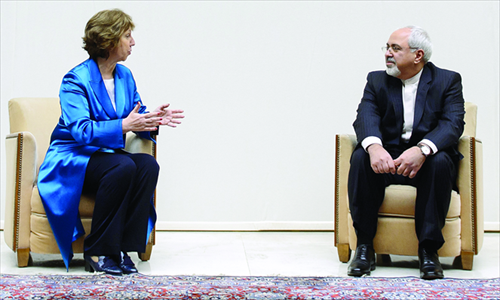Iran, world powers start talks

EU foreign policy chief Catherine Ashton (left) speaks with Iranian Foreign Minister Mohammad Javad Zarif prior to the start of nuclear talks on Tuesday at the United Nations offices in Geneva. Photo: AFP
Six world powers and Iran started their first nuclear negotiations in Geneva on Tuesday since moderate Hassan Rouhani was elected as Iran's president, with Tehran hoping a "roadmap" could be agreed in the talks.
The West also expressed "cautious optimism" over the talks and an EU spokesman said Iran made a "very useful" proposal to break the deadlock with world powers over its nuclear program.
The talks between Iran and the so-called P5+1 group of the US, Britain, France, China and Russia plus Germany came after the first contact between Iranian and US leaders for more than three decades last month - a phone conversation between US President Barack Obama and Rouhani.
The Iranian Foreign Minister, also Tehran's chief negotiator, Mohammad Javad Zarif offered his country's proposal to the P5+1 group in an hour-long PowerPoint presentation, although diplomats have not disclosed any details of the proposal.
Following the talks on Tuesday morning, Iranian Deputy Foreign Minister Abbas Araqchi said that the global powers had "welcomed" Tehran's proposal and the substantive details would be discussed later in the day at the deputy foreign minister level.
"We think that the proposal we have made has the capacity to make a breakthrough. We had a very serious and good meeting this morning," he told reporters.
The proposal, entitled "Closing an Unnecessary Crisis, and Opening a New Horizon," contains three steps that could settle the long-running nuclear standoff "within a year," Zarif revealed on Monday.
Zarif said he hoped the Geneva talks would at least sketch out a "roadmap" for further higher-level talks, adding that the initial step could be achieved "within a month or two, or even less."
Michael Mann, spokesman for EU foreign policy chief Catherine Ashton, told reporters there was a sense of "cautious optimism" ahead of the meeting and that Ashton and Zarif dined together on Monday evening in a "very positive atmosphere."
China's foreign ministry spokeswoman Hua Chunying Tuesday told a regular press conference that China urges all parties concerned to properly settle differences, search for pragmatic and viable solutions, start a new phase of substantial negotiations and seek early progress.
Li Weijian, director of the Institute for Foreign Policy Studies at the Shanghai Institutes for International Studies, told the Global Times the biggest difference between Tuesday's negotiations and previous rounds of talks is that all relevant parties have showed their readiness and willingness to seriously address the issue.
"In the past, the two sides were often at in a state of strong confrontation and mutual accusation before their negotiations, which means they were forced to enter into dialogue to prevent the situation getting out of control," he said.
"In contrast, this time, the atmosphere is totally different because both Iran and the West tried to create loose conditions before the start of the talks. Both of them are aware that they resume the talks to find a long-term and final solution to the nuclear issue. This laid a good foundation for the talks and that makes it possible for a breakthrough," Li added.
After meeting Ashton in London on Sunday, US Secretary of State Kerry said the window for diplomacy with Iran was "cracking open."
However, Israel warned world powers against any "partial agreement" with Iran.
"Iran believes it can get by with cosmetic concessions that would not significantly impede its path to developing nuclear weapons, concessions that could be reversed in weeks," Israel's security cabinet said in a statement.
The moment comes for the first time ever over the past decade for world powers and Iran to reach a final agreement on the nuclear issue, Yin Gang, a research fellow with the Institute of Western Asian and African Studies at the Chinese Academy of Social Sciences, told the Global Times.
"Iran might make a formal and irreversible pledge to not ever develop nuclear weapons and accept IAEA's total inspection. In return, the West needs to respect Iran's right to peaceful use of nuclear energy and loosen sanctions against Iran," Yin said.
A US administration official told reporters on Monday that any potential sanctions relief would be "targeted, proportional to what Iran puts on the table."
"No one should expect a breakthrough overnight," the official said speaking on condition of anonymity.
Agencies contributed to this story